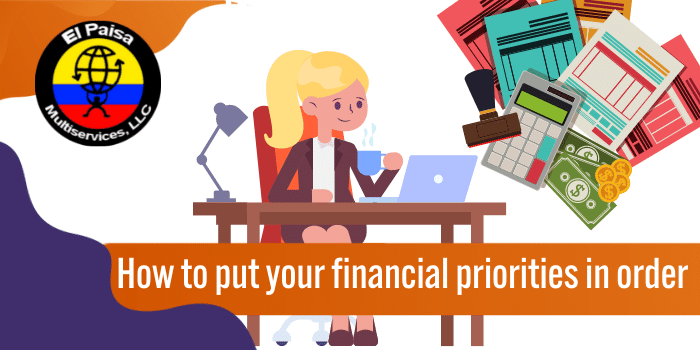How to put your financial priorities in order
Published 08/04/2021

Having your financial priorities in order is, in other words, learning to manage your money well.
It means that we know how to differentiate what goes first and what goes after and what you are focusing on (which is more relevant now).
However, not everyone has their financial priorities in order. Part of the reason people do not achieve their economic well-being is that they are not clear about the importance of things in terms of money.
When you change your priorities, you change the way you spend money.
The priorities change according to your age, your beliefs, and what you have lived. When you are 22, it doesn't matter what happens to your money because you have a whole life ahead of you, but at 30, you tend to settle down. At 40, you are worried thinking about the future of your children, and at 50, you are thinking about when the pension will arrive.
Do you want to grow financially, have financial stability a wealth, give yourself your tastes, and be able to save?
You must know your priorities so that your relationship with money is healthier. When you are clear about them, making decisions will be easier, faster, and more accessible. We will not put our likes, whims, and compulsive actions before them.
Many of us do not have money problems. What we have are priority problems. A person who grows is because he knows his priorities.
What are your priorities?
Your priorities define the way you live. If your preference is to give yourself all the luxuries, have the best house, a supercar, have expensive things to spend more than you earn, it is likely that you will always live in debt and that the salary will never give you.
Or if your priority is to save, spend less than your income, have a limit, travel with schedule, planning, and savings, save and then spend.
Steps to follow
Be clear about your current situation to know where you stand.
-
Define your financial goals: When you have them well defined, they will be reflected in your finances. Goals are aligned with your priorities. The first money we earn each month will be for what we have defined as most important.
-
Change the paradigm and mindset: It is clear that we have to start changing our situation and how we see and manage our lives. Put all of our scarce resources — time and money — first on the things that matter to us.
We invite you to think about those things that are important to you and to build financial goals that reflect your priorities. Having them clear is the first step to truly making a positive change in all aspects of your life.
-
Identify and classify your needs and preferences: The first thing you have to do to get your financial priorities in order is to know them. In other words, you have to understand what a need is and what is a taste or desire.
This is key because as long as you know which is which, you can discriminate what to do with each of them. We will satisfy our needs and then our tastes. But most people do it the other way around. They start with their tastes and leave their priorities out.
Evaluate your expenses: After identifying and classifying your needs and tastes, you must enter the phase of evaluating or analyzing each of those expenses; Giving it priority, according to your criteria and the level of importance required.
Change the way you spend. Start with your financial priorities.
-
Calls to action - make the adjustments: Having already identified and classified your needs and tastes; evaluated your expenses, you have to enter the most challenging stage of all. Begin to make the place adjustments. In other words, go from paper to reality.
To do it, you must integrate two essential tools:
-
Budget: A budget is a statement of priorities. The budget does not limit but frees you, helps you meet goals, shows you your consumption pattern, prepares you for emergencies, teaches you to get out of debt, and automates your savings.
-
The expense log: write down your expenses for a whole month to know where your money is going. Divide it into categories so you can have a better overview.
These two elements are decisive because on them rests the operational decisions that you must make.
As long as you have a reasonable budget and keep track of your expenses, you will be able to measure and evaluate your financial performance. This administration means that you will be able to find out if you have your financial priorities in order and make place adjustments.
At El Paisa Multiservices we want to help you with your financial movements. You can contact us if you have questions about our services.
By Ingenuity & Solutions

